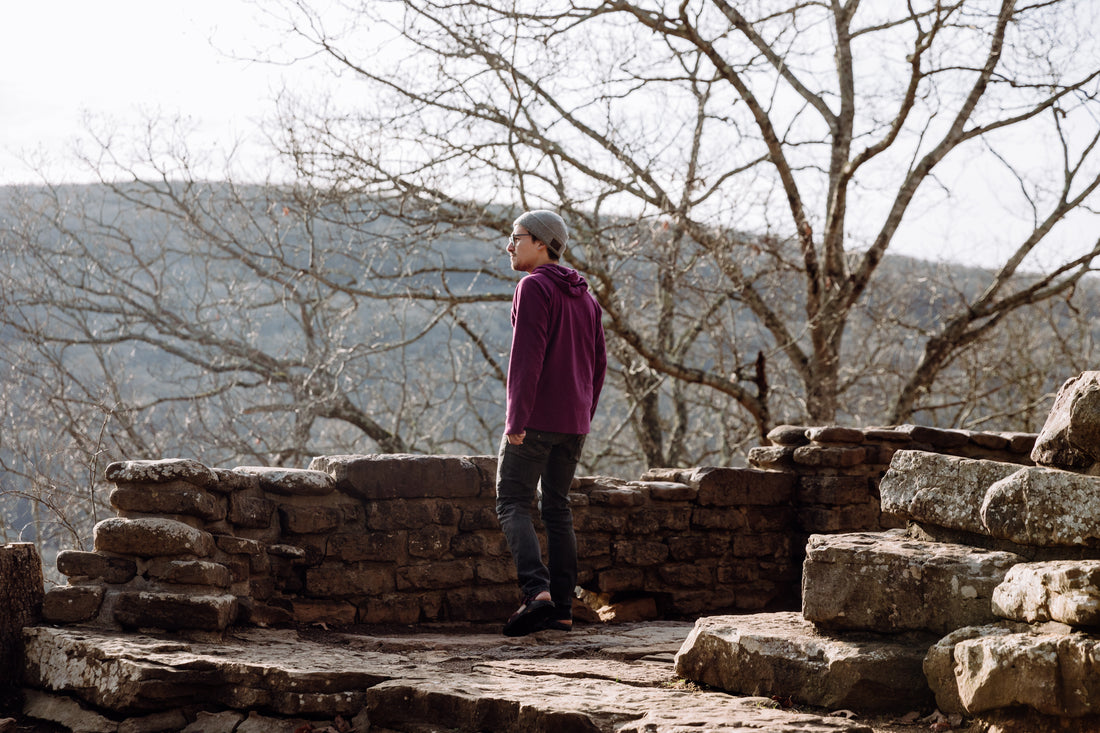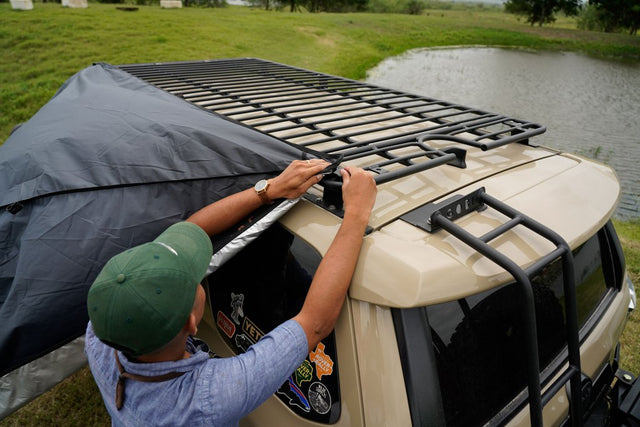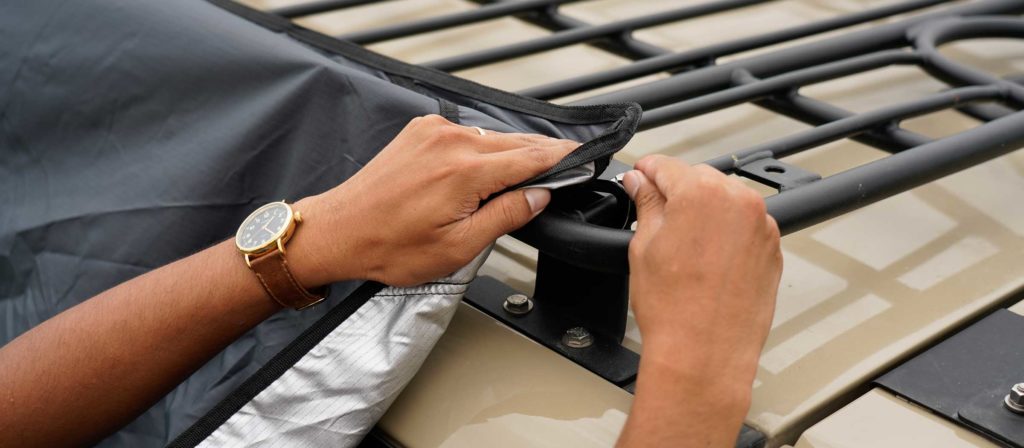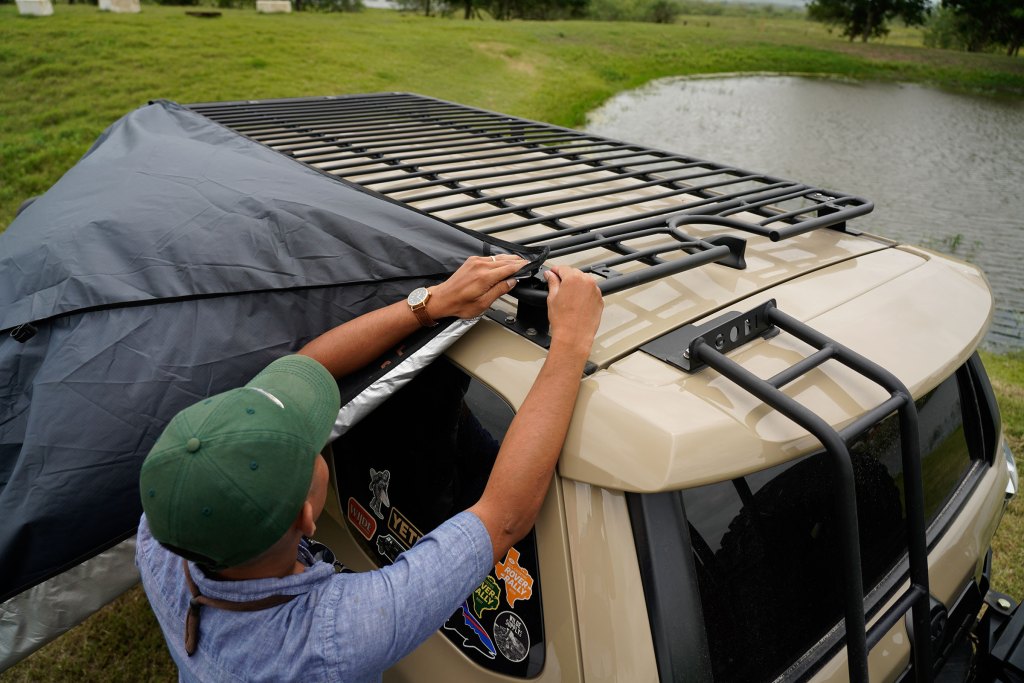
Filmmaker’s Notes:
The final stretch of our journey was a bit of a slog. We had gotten a little sleep here and there at rest stops since leaving Topeka, but as we rolled into the Arkansas highway rest stop where we’d hoped to spend the night, the “No Overnight Parking” sign had us grumpily relocating to the next best option: the lot behind a Cracker Barrel.
Before we could settle in, we noticed the glow of a yellow neon sign, attracting us like moths to a flame. To a hungry, road-weary traveler, Waffle House is like a place of refuge. While we were devouring a late night breakfast, Richard told a story from years back, when he was living for a while in an unfamiliar Texas city, about how he’d go to Waffle House at night on a weekend all by himself, people watching and chain-smoking cigarettes. One of those nights, an old man pulled some change out of the pocket of his Wranglers to tip the waitress, and she pointed to the shiny metallic disk he was holding. He said it was a quarter that he’d kept in his pocket since 1956; it was worn smooth and completely blank.
It had felt like a cinematic moment, a story of a life held in the old man’s hand. Maybe it’s a heavy handed metaphor, but we felt a bit like that quarter – worn down from the road and the pace of the last few weeks, but full of stories.
When we met Seb in Arkansas, it was the first time we’d met in person. They had been living in Utah when they started working on projects with MOON as a contributor; flash forward to now, and Seb is one of the leaders of the company. (From the first piece that Seb had written for us, it seemed obvious that they knew their voice and had spent the time and work that it takes to start understanding who you are.)

Henry:
So I’m just gonna ask you a dumb transparent question to start, since we already know each other a bit - who are you?
Seb:
Who dat? Okay that works! I’m Seb Cancino. I use they/them and he/him pronouns. I'm originally from Dallas, Texas, but I was born in Chile. My father's side of the family, we're all from Chile, and my mom's from South Texas. I grew up most of my life in Lewisville, which is a smaller suburb of the DFW area. Yeah, I've had my van for about two years now. It's my baby - “Babe” is their official name.
I was living on the road until COVID hit, pretty much from the spring of 2019 until late summer 2020. (After that) I was staying with my parents for a little while and just found a new spot here in Fayetteville, Arkansas, just moved in yesterday, which feels surreal, after having no homebase for about two years.
Henry:
What parts of it feel surreal?
Seb:
When I first moved into the van, I was going to work for a summer season at a school, an outdoor education school in Washington. So they provided us with a cabin, and it was a six month contract. So I was like, I have my own space but I also know that there's like a number of days that I have in this place until I have to move out, and it's kind of outside of my control.

Then moving from that into working in wilderness therapy in Utah, I was living full time in the van and didn't have any kind of place to call home, which was my choice, and it was amazing. So I think just being able to get in the van and go home, to a home with four walls that are mine, and be able to control my space – going from road life, especially during 2020 and the pandemic and being on the road while that happens, it just kind of threw me for a loop. So having a place where I can lay my head and feel safe all the time is a huge weight off my shoulders, I think.
Henry:
How do you think COVID impacted the accessibility or freedom of living on the road?
Seb:
I was living in California and Salt Lake City for most of that time so I would crash in someone’s driveway for a while in the van, but when I was living and working in the mountains of California, a lot of those small communities were either shut down or not especially welcoming to people from outside the area. And not because they weren't normally welcoming tourists, it's just like they're trying to protect their communities. And I totally felt empathy for that. Even being a contributing member of that community in June Lake, it was hard to find reliable camping, then the wildfire started in August, and I just had to leave.
Having a place where I can lay my head and feel safe all the time is a huge weight off my shoulders, I think.
From a personal perspective, I just got really lonely, I got super lonely, and I was by myself out there. There wasn't a lot of community being built just because of COVID, and the fires and all that stuff – I was feeling under a lot of pressure from a lot of different directions. And services just weren't reliable, a lot of public restrooms and towns and businesses were just shut down, campgrounds were shut down.

That level of stress, which I used to find kind of exciting, like where am I gonna sleep tonight, that was kind of part of the adventure and was always appealing to me with van life, but it became more like, where can I go that I'm gonna feel safe and welcome, and I can actually go to sleep and feel okay that I'm there. It was a narrower selection of options.
Henry:
One thing that I’ve always appreciated about you since we first connected is there's a groundedness to you, and I think as we've gotten to know each other I’ve realized it’s because you've experienced a lot of life. I think when people see van life, it can seem very glossy, like there’s just a little bit of a veneer on it. I guess this is a two part question, but I’d love to know, what does van life give you? And why do people put up with the bullshit of all the stuff that you have to do? Like, I feel like we spent half of our time just moving stuff around the van. For you, what are the benefits and the cost?
Seb:
Yeah, I think the freedom and the mystery of “where am I gonna sleep?” is really alluring. And for people who are trying to leave their everyday routine in favor of van life, that is really exciting. Being able to pick up and go out (on the road), going out becomes your life. If I got bored of a place or it got packed, I would just go down the road or I'd go a few miles or a few hours away and be able to just show up. I think as a backpacker - I guess that’s my outdoor identity - I like to have everything with me and just be self sufficient. So the van life offered a lot of that.
That level of stress, which I used to find kind of exciting... became more like, where can I go that I'm gonna feel safe and welcome?
On the flip side, some of the things that were just really tough are that you have a finite amount of space and somehow you just always end up with more stuff, no matter what. You're always trying to purge. You're always shuffling things to get stuff in and out. You’ll see when we go visit the van, my build is super rough and so I don't have a lot of storage, so I gotta Tetris my whole life around under the bed. I don't have a toilet or a shower, I use a solar shower or shower at rest stops or truck stops. So when campgrounds shut down, or they were limiting access, you had to have your own bathroom in your camper to be able to live, which wasn't an option for me. You have to calculate every move a little bit more.
I think as a backpacker - I guess that’s my outdoor identity - I like to have everything with me and just be self sufficient. So the van life offered a lot of that.
Henry:
I know you used to work in the outdoor retail space, and now you’re pursuing a degree in conservation. It feels like your whole life is about being outside – where did that begin for you?
Seb:
Your question is interesting, because where my connection to the outdoors, and even to the outdoor industry began, I would say is in two parts. My connection to nature started really young with my family. I don't have memories of Chile, as a child, but there are pictures of me and my family at Torres del Paine, which is a world renowned National Park, and I look at those experiences as being formative to our family as an outdoor family, and to me, really connecting with nature and connecting with people in nature. Later as a kid, we went to state parks in Texas all the time, we spent time in Arkansas and Oklahoma. National parks were always on our summer road trip lists. I was something really natural to us.

Then I kind of started realizing like, Dad, I think those trails go further than a mile. I think we can do more. My family, we were very much “front country” people. And then once I started backpacking by myself in college, that's when I was just like, Whoa, I can load myself up and go live outside for however much time I'm prepared for. Then when it came to the industry, I got my bachelor's in marketing and I wanted to work in retail fashion and styling and things like that, and I quickly realized, I don't think I have enough in common with this group of people besides work, which wasn't really fulfilling.
Then I kind of started realizing like, Dad, I think those trails go further than a mile. I think we can do more.
So at that point, I was working at Nordstrom, which was a really great experience, but not as fun as I wanted it to be. So I took a part time seasonal sales job at Whole Earth Provision in Dallas, in 2011. I took a 50% pay cut just to do that, and I was like, this is it. I get to sell bomb sleeping bags every day, and merchandise the whole store and do window displays. Then I ended up opening a store and managing retail for them in one of their locations. So, fast forward to now, and I’m continuing to work in the outdoor industry, whether it's outdoor education or retail, and now in customer service for Moon, it's like, I still get to hang out with amazing people, be outdoors, make a living, and talk about it as much as I can. To some chagrin, I'm sure (laughing).
Henry:
You obviously have a lot of love and connection to this (outdoor) community, but part of your voice has been speaking up about things that maybe people don't often see or look at. I’m curious to know, what's the community giving you and where would you like to see it go?
Seb:
Yeah, the outdoor industry and just the outdoor community in general is really welcoming, and it is more diverse than the ads might say – the usership at least. When you go to Outdoor Retailer (Expo) or you go to any events, whether it's a hike meet up or something like that, for our national mainstream outdoor industry organizations, yeah, it's gonna be the cis/hetero white male or female. With that, I mean, being Latino and being queer, I've always been very open and honest about that, and brought that part of who I am to most of everything I do, just because it's not fair to have to not do that.

So I think just living in my truth, to steal some phrases, has always been really a place of power for me. And, you know, it has been discouraging sometimes, even from 10 years ago, when I entered the outdoor retail space, it's come leaps and bounds. And the conversations that we're having right now are beyond what I could have imagined, because of all the great organizations that are doing the work. I think when we think about diversity, equity, and inclusion, the diversity is pretty much already there in a lot of spaces. The equity, not so much. The inclusion, maybe not so much.
Being Latino and being queer, I've always been very open and honest about that, and brought that part of who I am to most of everything I do.
That works by creating equal opportunities, creating inclusive spaces, and actually having the conversations and confronting those issues that are keeping the social aspect of the industry held back. We can't move forward until we talk about it. I guess that's been part of my role, just talking about it in ways that feel appropriate, ways that feel like people can come to the table and be real and be vulnerable. And ask questions and feel stupid sometimes, like, we're all going to feel stupid and ask the wrong thing or say the wrong thing. We're just people, I think that's the thing. We all love the outdoors, we're looking to conserve it, enjoy it, and hopefully pass it on to our next gen. And I think when we appreciate people as whole people, those experiences are just way better.

Going into our conversation with Seb, we knew that this was the last interview of the On the Road series. Up to this point, we’d had the strange experience of meeting people and creating a kind of mini-relationship in the short amount of intimate time we’d had with them, and then left that experience with the knowledge that our paths may never cross again. With Seb, it felt sweet to know that this was someone on the team, someone we’d get to have an ongoing relationship with after the trip was over.
We packed up our camera and our equipment for the last time, and pointed the van toward Texas, where we’d started this road trip three weeks before. On the drive home, Richard and I joked about the funny moments for a while, until the laughter eventually subsided and we sat in silence, reflecting on all we had seen.
Looking back now on the trip we took, some things began to come into focus for me out on the road. Moon began with our co-founder Matthew leaving a job to pursue a vision of a life that had balance, and to find a space outside of the culture of hustle and ladder-climbing. At the start of this journey to meet a scattered community of people that had connected with us, we wanted to do something that embodied that same desire to leave our “normal” life behind, and find peace and solace in the adventure.
What we found, after meeting the twelve different subjects of the series, were a lot of people with the same priorities. We had wanted to use this as an opportunity to create something that felt fun and inspiring to us, and it was that, but it was also something new: proof that there is always something out there to learn that you would never know if you didn’t go.




